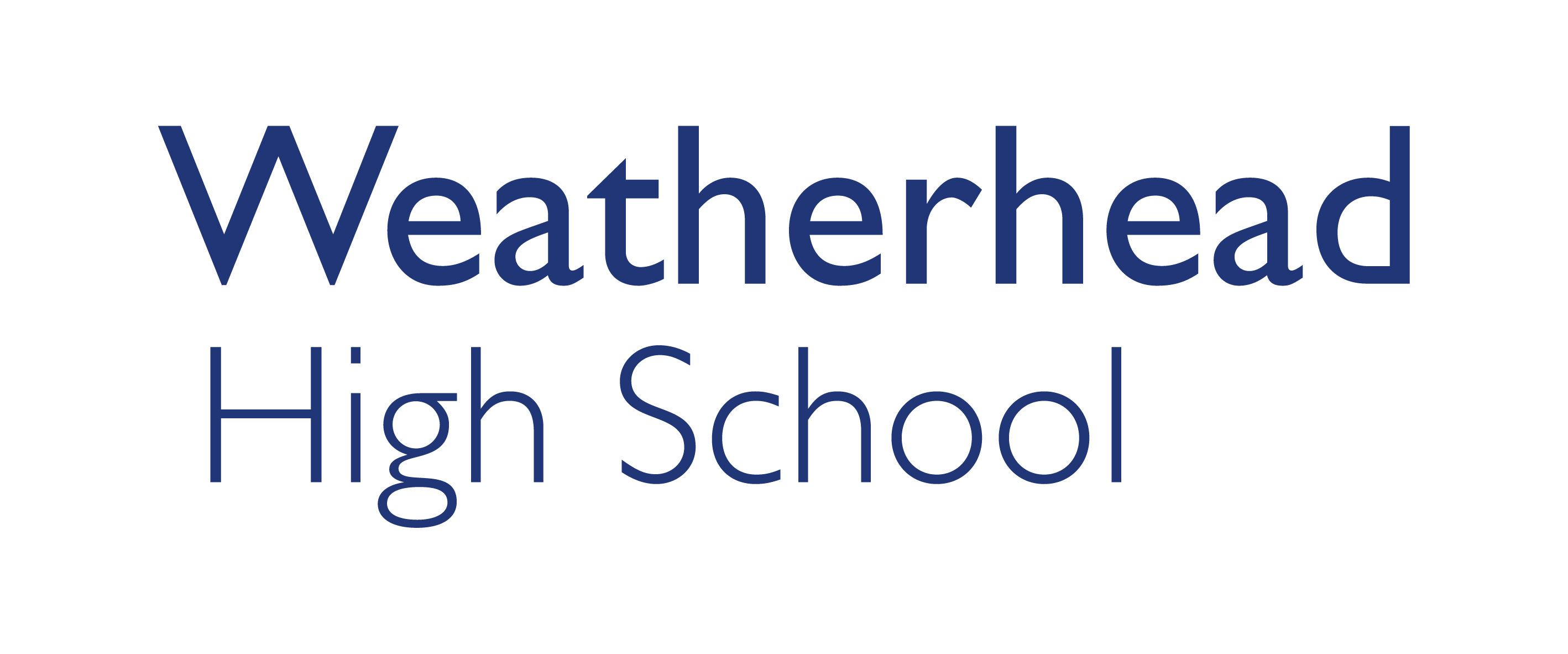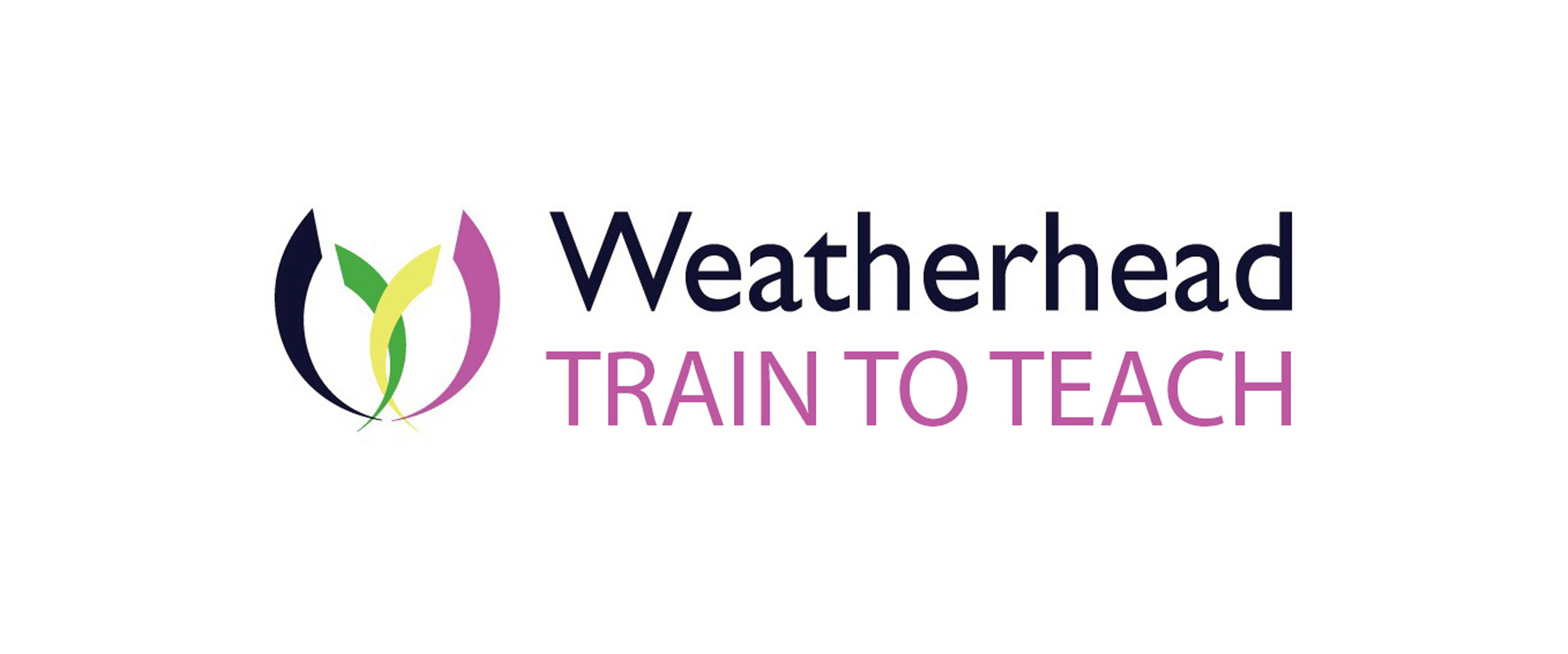Curriculum Vision and Aims
A World Class Curriculum
Preparing Weatherhead Students for life-long learning
INTENT: What we are trying to achieve with our curriculum
- Create an aspirational, high achievement culture that engages students to achieve success by following an ambitious and broad curriculum: there is a high academic ambition for every student.
- Develop deep learning across the arts, mathematics and science, technology and enterprise, leading to the mastery of robust knowledge, which prepares students for the world of work in 2030 and beyond.
- Ensure that all students are taught the skills to perform well in a subject and then build on the knowledge they acquire in lessons, enabling them to solve problems, think deeply, embrace challenge and articulate their reasoning as a result of what they have been taught.
- Promote high levels of independence, team work, enjoyment, engagement and personal reward for all learners.
- Acknowledge and address disadvantage and provide equality of opportunity for all students by creating a fully inclusive curriculum with no barriers to learning, as well as placing high value on literacy and numeracy across the curriculum, with the aim of developing sufficient skills and knowledge needed for future learning and employment.
- Develop and maintain students’ cultural understanding and knowledge needed to live a healthy and rewarding life, as well as appreciating the values that underpin British society.
IMPLEMENTATION: Weatherhead’s World Class Curriculum
Key Stage 3:
- Students study a broad and balanced curriculum for three years.
- Alongside the core subjects, students develop their appreciation of the creative arts through separate Music, Dance and Drama lessons. They develop their understanding of healthy living through Food and Physical Education lessons and learn to appreciate the importance of culture through Art, Design Technology, History, English, MFL and RE.
- Our STEM subjects and Computer Science are an important part of the curriculum in a single-sex school. We are committed to developing the skills needed for future employment in industries and the job sectors that have not yet been created.
Key Stage 4:
- The GCSE options pathway chosen in Year 9 promotes breadth and allows students to study the arts, practical and BTEC courses, as well as new courses not offered at KS3.
- The skill of learning a new language is valued and all students are given the opportunity to study a Modern Foreign Language qualification (either to GCSE or FCSE level), as part of the core curriculum without limiting option choices.
- Most students opt to study History or Geography with a small number of students studying BTEC Travel & Tourism as an appropriate alternative.
- For students who have an aptitude for Science, separate Science subjects are taught at GCSE without reducing option choices.
- The development of a student’s personal, social, cultural and mental well-being is taught in PSHCE and through Tutor Time lessons as well as in PE lessons.
Key Stage 5:
- Progression to university, higher-level apprenticeships or employment underpins the Post-16 curriculum.
- The school places equal value on academic, technical and vocational pathways for students.
- Through enrichment and supervised study lessons, students are taught valuable research and learning skills needed for university or further training and beyond.
- The Sixth Form enrichment programme allows students to volunteer in the local and school community; providing students with practical work experience.
- Students all undertake additional qualifications e.g. EPQ, MOOCs, Level 2 Sports Leadership Award and other leadership qualifications.
- Level 2 pathways are offered to some students as a ‘stepping stone’ to Level 3.
Curriculum Beyond the Classroom:
Our Curriculum extends beyond the classroom and our extensive and unique extra-curricular programme adds a real richness and colour to the school.
- Duke of Edinburgh Award – Bronze, Silver and Gold and JASS scheme for Year 7
- GCSE Latin for KS3 students
- CREST Award and STEM activities
- Level 1 Sports Leaders Awards
- Level 2 Sports Leaders Awards
- Liverpool University Scholars’ Programme
- First Aid qualifications
- Debate Club
- HE+
- Oxbridge residential
- Russell Group residential
- Sutton Trust
- MFL Trip to Barcelona & Madrid (pre-pandemic)
- Weathertots
- Weatherfriends
- Charity work
- Work experience
- Authors week (and LRC event e.g. Harry Potter Evening)
- Year 8 Public Speaking competition
- Key Stage 3 & Key Stage 5 University seminars
- Alumni
- Community Sports Leaders Awards
- Arts Award
- LAMDA (Drama)
- Music Grades (ABRSM)
- Theory Grades (NATD)
- Dance qualifications
- Sporting Coaching qualifications
- Performing Arts Events
- Local and National Competitions e.g. Design Ventura, Chris Salmon Poetry Competition
- World Class Ambassadors
- Theatre trips
- MFL restaurant trips
- KS3 trip to Stratford-Upon-Avon
- Year 7 Conway Centre residential trip
- Humanities trip to Berlin (pre-pandemic)
IMPLEMENTATION: How we deliver our curriculum
1. Skilled Curriculum Teams:
Highly skilled subject specialists and support staff deliver quality first teaching. High quality teaching and learning is at the heart of the curriculum. All members of staff participate in National College training and they are supported to engage in high quality professional development (including membership of subject networks) and in-house training programmes.
2. Coherence:
Curriculum planning shows that teachers share with students the ‘bigger picture’, so they understand why they are learning a concept and their learning has a context. Curriculum planning is not a sequence of chronology with no purpose. Departments work collectively to plan for and implement cross-curricular links.
The curriculum is planned and sequenced so that new knowledge and skills are built on what has already been taught before and towards clearly defined end points. A sequential approach to curriculum planning is adopted. The planning builds upon the acquisition of core knowledge needed in each curriculum area to support the development of deeper, more complex understanding of concepts to support future learning.
3. Challenge and Rigour:
Stretch and challenge for all is at the core of curriculum planning. The high expectations regarding progress and achievement create a culture of learning, success and high aspirations, which also encourages students to become independent learners.
4. Mastery:
The culture at Weatherhead encourages students to take risks when learning and mistakes are viewed as opportunities for learning, so the practice of ‘hold the grade’ and feed-forward activities are built into curriculum plans and planning schedules. Subject masterclasses are delivered by our specialist curriculum teams to enhance learning and promote subject mastery. ‘Making it stick’ or ‘mastery’ strategies are widely used in a variety of ways through lessons where staff ensure there is plenty of practice to retrieve information from previous learning and link it into what is currently being taught, this helps to ensure that learning is embedded into long term memory. Teaching is designed to help students remember the content they have been taught in the long term enabling students to know more and remember more.
5. Effective Assessment: Walk and Talk Assessments
High-quality teacher-talk and conversations about learning with students acting on that information are a feature of all lessons. Effective assessment includes the use of verbal and written questions; low-stakes testing, quizzes, formal half-termly and termly tests and end of year exams. The purpose of assessment is to identify and address misconceptions and provide feedback to students. The curriculum has plenty of opportunities for ‘dedicated improvement and reflection’ (DIRT) where students are encouraged to act upon any feedback they have received using a purple pen.
6. High Focus on Vocabulary, Literacy and Numeracy Provision:
Students are taught to speak and write fluently, so that they can communicate their ideas and emotions to others, as well as developing resilience and problem-solving skills. The whole-school literacy focus of the week and word of the week (from different subject areas) help students to develop sufficient knowledge about language and application of skills for future learning and employment.
In addition to English lessons, Year 7 and Year 8 students benefit from an extra Literacy period per week to focus on Forensic Reading; this enables students to explore a range of texts in depth (both fiction and non-fiction) and allows them to hone their inference and deduction skills in a cross-curricular format while providing a platform for meaningful discussion of topical ideas such as Climate Change and Gender Bias. There is an explicit focus on vocabulary learning where students regularly learn, record and review Tier 3 vocabulary in order to deepen their mastery of the English Language.
Twice per week, form tutors undertake guided reading under the Register and Read initiative to encourage confidence with oracy, inference skills and reading for pleasure.
Through the form time numeracy programme (fortnightly) form tutors deliver number activities, games and quizzes, which develop the functional numeracy needed for future learning and employment.
7. Spiritual, Moral, Social and Cultural Education across the Curriculum:
In addition to our work in promoting British Values through our personal development programme, assemblies, wider extra-curricular opportunities and trips/visits, our students are educated about the core British Values and prepared for life in modern Britain through related areas in our curriculum.
For example, students in Year 7 study democracy through the history of democratic Britain, learning about the Magna Carta and the English Civil War; in Year 8 students explore how beliefs in Islam, Sikhism and Christianity affect the lives of individuals and tolerance of different beliefs; students in Year 9 study the rule of law through cyber security, GDPR and copyright/plagiarism in Computing lessons; in art lessons students learn about tolerance and mutual respect through the study of artists from different cultures/sexualities/bakcgrounds.
To embed knowledge and awareness of the fundamental British Values and bring discussion to the forefront, our curriculum schemes of work and lesson resources highlight the links to British Values and are designed for students to make connections between the relevant subjects and content.
8. Transition:
A well planned and coherent transition programme for all students as they move key stages. Departments have effective links with primary schools to ensure that prior skills and knowledge is built upon and that there are no ‘wasted’ years. These primary links are an integral part of the curriculum planning process and the implementation of the curriculum. With knowledge of the Key Stage 2 curriculum and pedagogical practices, we are able to plan a smooth transition for Year 7 students and build on their knowledge and skills whilst reinforcing and recapping existing learning.
9. Preparing Students for the World of Work:
The Gatsby Benchmarks are embedded across the school from Years 7-13 and are an integral part of our curriculum and extracurricular opportunities.
THE EQUALITY ACT OF 2010: How the curriculum reflects the Act
- The world class curriculum is accessible for all students. All students are provided with the same high quality curriculum provision regardless of background, starting point or disability.
- The curriculum is adapted to meet the needs of all students and is fully inclusive for all students. The school, teachers, Director of SEND and teaching assistants ensure that no student with a disability is disadvantaged compared to other students.
- All students are given the opportunity to study a broad and balanced curriculum for example: Spanish, Humanities, Performing Arts, PE, DT and Food.
- In addition, in terms of the wider ‘extra’ curriculum, all students are given the opportunity to attend school trips and join extra-curricular clubs in school. The school makes reasonable adjustments and modifications to ensure all students are given the opportunity to experience the benefits of enjoying the wider participation in school life.
How can I find out more?
If you want to find out more about the curriculum we are following, please email: [email protected]
You can also visit our subject specific pages and our KS3, KS4 and KS5 curriculum overviews.

